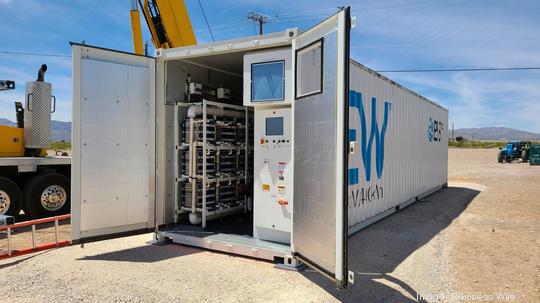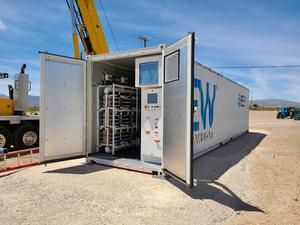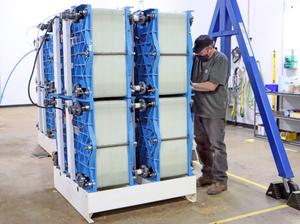
ESS, the Wilsonville company that's trying to grab a piece of the fast-growing grid energy storage market with a novel technology, got an endorsement Monday from an industrial heavyweight.
Honeywell (Nasdaq: HON) bought $27.5 million worth of stock from ESS (NYSE: GWH) and prepaid $15 million toward a target of $300 million in product purchases by 2030, the companies announced.
"ESS was well-funded before, but with this deal we have additional resources and a clear runway well into 2025 as we drive toward profitability," ESS CEO Eric Dresselhuys said in a call with investment analysts before markets opened on Monday.
Charlotte, North Carolina-based Honeywell bought 16.5 million shares of ESS stock at $1.67 per share, a 24% premium on the closing price last Thursday when the deal was sealed. ESS closed up nearly 26% at $1.75 on Monday.
The agreement has warrant provisions that could boost Honeywell's investment by another $38 million in the next five years.
Long-duration storage
ESS makes a "flow battery" system that stores energy in an iron-based liquid electrolyte. A chief selling point is output of up to 12 hours, at least three times what lithium-ion battery systems, the dominant grid storage technology, offer.
"The demand for long-duration energy storage represents a compelling market opportunity within the energy transition and the combination of Honeywell and ESS technology can accelerate decarbonization for the commercial, industrial and utility sectors," Bryan Glover, chief growth officer in Honeywell's performance materials and technology group, said in a statement.
ESS has notched some interesting deals and made a modest number of deployments of its shipping-container-housed Energy Warehouse units since going public two years ago. Whether it delivers as promised and gains traction has remained an open question.
Dresselhuys sees the Honeywell deal opening new doors as Honeywell includes ESS products in its offerings and as ESS continues its own sales efforts (the deal doesn't have any exclusivity provisions, he said).
Honeywell could buy and resell ESS units under the deal, or incorporate ESS "core componentry" into other configurations, the CEO said.
"Anytime you bring somebody of Honeywell's strength and stature to the market, that's going to be goodness for us," he said. "We're obviously still a young company with limited resources on the go-to-market. … When you're talking about projects at this scale, there were a lot of people who get a comfort from having somebody like Honeywell involved in the technology and involved in the deal."
Joint development agreement
ESS also gains license to Honeywell's own flow-battery intellectual property, and the companies will collaborate on innovation, ESS said.
"The joint development agreement has the opportunity to accelerate improvements across all of the things that we're working on already," Dresselhuys said, pointing to performance, durability and cost.
ESS raised around $250 million by going public through a SPAC merger in October 2021 and has poured tens of millions of dollars into building out its Wilsonville production capacity. As of the end of last year it had 271 full-time employees, most in Wilsonville.
The company reported $2.8 million in revenue in the quarter ended June 30, with a net loss of $22.9 million. It had $99.5 million in cash and equivalents on hand. Like many SPAC IPO companies from 2020 and 2021, its stock has struggled: Shares began trading in October 2021 around $8, surged briefly higher, but then slid and have been under $2 most of this year.





